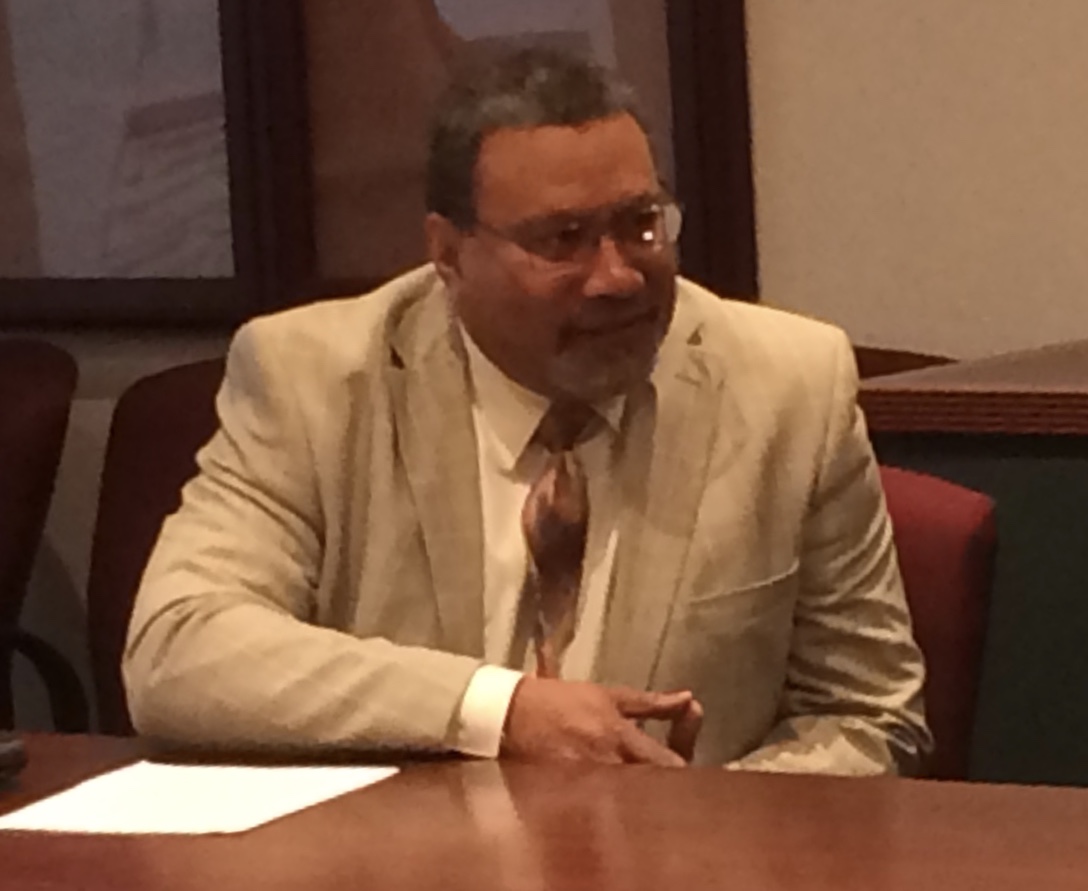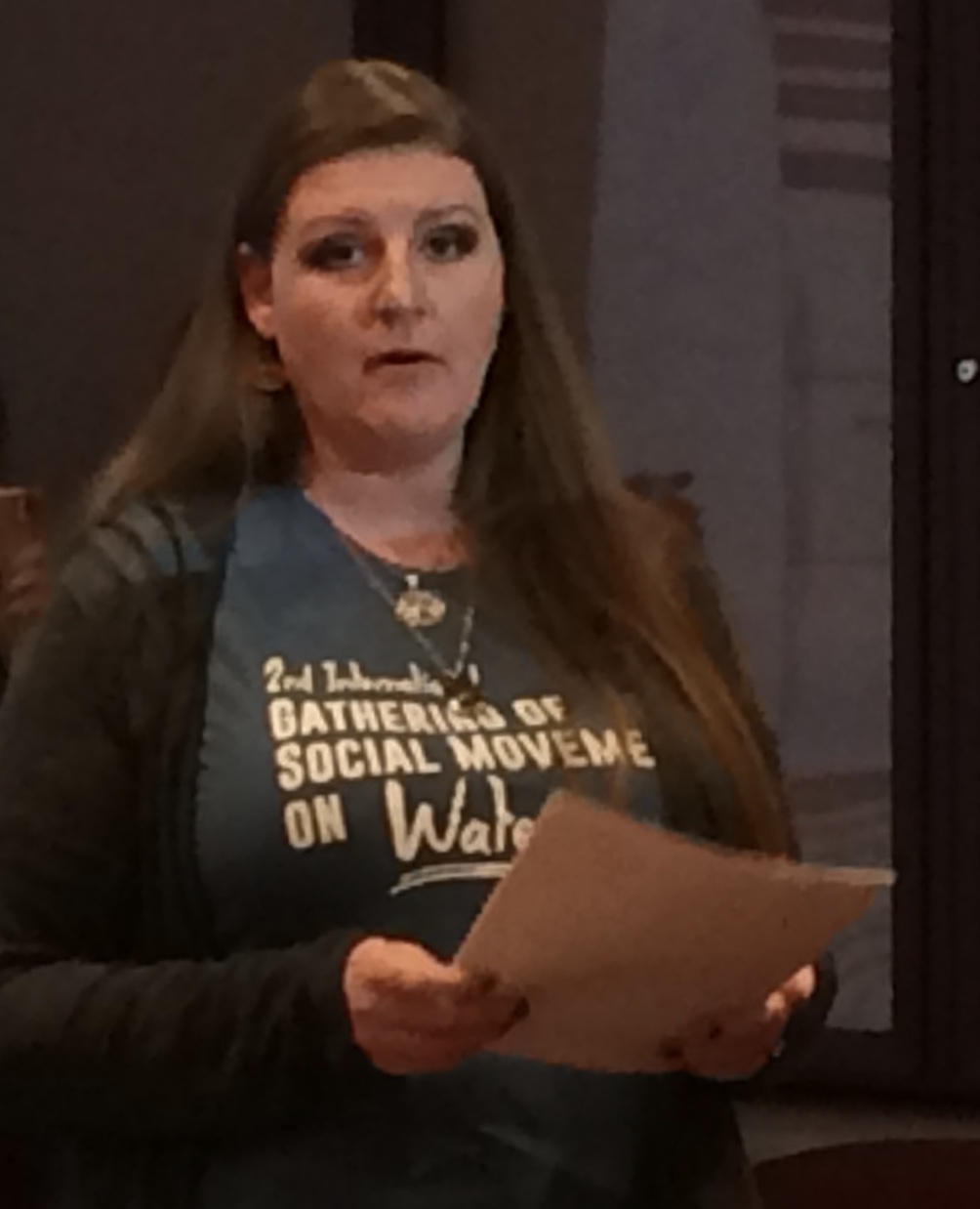By Jan Worth-Nelson
Six Flint residents, all of whom described searing effects from the Flint water crisis, spoke up at the meeting of the Hurley Medical Center Board of Managers Wednesday night to say, “Words matter.” They asserted that a recent statement by a group of Hurley doctors has dealt a major blow to the community’s already decimated trust and is based on “preposterous” claims.
The Flint residents were there to protest an action led by Hernan Gomez, a toxicologist, and reportedly supported by the majority of Hurley doctors, to stop using the word “lead-poisoned” in reference to children who experienced the Flint water crisis and to substitute the word “lead-exposed” instead.
The Hurley doctors, after publishing a 10-year study of Flint children’s blood lead levels in the June 2018 Journal of Pediatrics with Gomez as lead author, said what happened in 2014-2015 did not constitute an environmental emergency and that using the term “lead-poisoned’ could cast a whole generation of Flint children as stigmatized.
They stated “Not a single child in the City of Flint has been lead-poisoned from the water switch. Rather, they were lead-exposed.”

Yvonne Lewis (Photo by Jan Worth-Nelson)
One by one, however, the six Flint residents recited the familiar chronology of the crisis, from the time when “our complaints and concerns had been ridiculed dismissed and minimized for months” to the moment–in that very same conference room, in September, 2015, one speaker noted–when the medical and public health community told Flint residents not to use their tap water because it had been contaminated by lead.
Yvonne Lewis said she along with others had worked long and hard since April 2014 to try to help the community understand the impact of the crisis on their lives and to advocate for the community’s needs–often relying on the expertise of the medical community about the effects of lead on pregnant women, children, and senior citizens.
“It took us a long time to help our community understand the gravity of the situation,” she said.
“I understand that you as physicians have a great deal of respect in our community, and as a result we have put our lives in your hands.
“But when we start shifting the language, when we start hearing those whom we’ve entrusted our lives to, to seemingly minimize the impact of this very important issue, it becomes devastating and then another hit at trust. And if we can’t trust those who care for us, who can we trust?”
“What is it that you really believe?” Lewis asked the board. “When you’ve lived the experience, what impact, what change has it had on you? I just ask you to consider: if you choose to make the language different, how will you choose… to improve the quality of life?”
“Words matter,” Clarissa Camez repeated. “It is very important that we as a community are able to trust you.”

Lawrence Reynolds (Photo by Jan Worth-Nelson)
Dr. Lawrence Reynolds, a pediatrician and child community health consultant, former past president of Mott Children’s Health Center and Genesee County Medical Society, who has been vocally involved in lead crisis activism since the beginning, noted how in the early months county, state and federal governmental agencies argued over who was in charge and whether it was an emergency or a disaster, while nonprofits and community organizers “coalesced to deliver water and filters until an official response was deployed.”
And three years later, he noted, after numerous activities to address this “preventable exposure and mass ingestion of a known toxicant, some members of the Hurley Medical Staff announced the exposure as just an exposure, forgetting the ingestion and unmeasurable incorporation of lead into bone, teeth and brain.”
He said ” the exposure and its disparate impact was delineated by one’s address, a feature of environmental injustice overlooked by the limited context of the statement issued by the Hurley medical staff.”
“Under ideal circumstances,” Reynolds said, “with access to the appropriate nutritional, developmental and educational services, we may be able to take advantage of the plasticity of ever developing brains and prevent damage to other organs. Because of a host of variable in age, physiology and developmental stage, we are hard-pressed to identify who will be most or least harmed.”
In light of “the protean harm and mental trauma caused by the crisis and attempts to minimize it,” he asked that the Hurley Board of Managers “make it clear that the reported medical staff statement does not represent its views and is a statement of staff members only.”

Melissa Mays (Photo by Jan Worth-Nelson)
Melissa Mays, one of the leading water activists, called the claims underlying the Gomez statement “preposterous,” adding, “let me just explain what hurts my sons more than the title of being ‘poisoned’: being lied to by officials who are hired or swore an oath or protect them; their pain and struggle being downplayed by those who swore an oath to protect them; and losing essential medical education, physical and mental health resources because some decided to remove the urgency of the situation.” Mays and her family were part of a settlement in a class action lawsuit against the state, with the ACLU and the Concerned Pastors for Social Action, that required the state to provide $100 million for pipe replacement, door-to-door filter deliveries and free bottled water for Flint residents.
The other speakers were Ariana Hawk and Joelena Freeman. About ten other residents were there in support but did not speak.
Board member Jason Caya, co-founder and partner of Tenacity Brewing, who had been appointed to a five-year term by Flint Emergency Manager Darnell Earley in 2014 just before the events that triggered the water crisis said, “I want to assure you the concerns you raised here will be taken seriously.” He said any concerns would be investigated “as appropriate”– but that the board would not respond at the meeting.
“Please don’t take this as a sign of disrespect,” he said. No other members of the board spoke.
When they were finished with the five minutes allotted to each of them in the public comment section of the meeting, they quietly left the Charles White Conference Center room and the regular meeting resumed. On a purple chair, they left a sign that said, “Flint Residents were POISONED, not just EXPOSED. We are EXPOSED to lead 24/7 for FOUR YEARS.”

(Left to right) Melissa Storm, Hurley VP and General Counsel; Board of Managers member Frances Gilcreast; Hurley CEO Melany Gavulic, Jason Caya, (Photo by Jan Worth-Nelson)
Introducing herself outside the meeting to the speakers and press, Laura Jasso, from Hurley’s marketing and community relations office, said to her knowledge neither Hurley management nor the board of managers planned to issue any statement separate from that delivered by Gomez and most of the other Hurley doctors. She took names and emails and said the group would be notified if that happens.

Hurley board members Ronald Stewart, Dan Scheid, Phillip Shaltz (Photo by Jan Worth-Nelson)
EVM Editor Jan Worth-Nelson can be reached at janworth1118@gmail.com.



You must be logged in to post a comment.